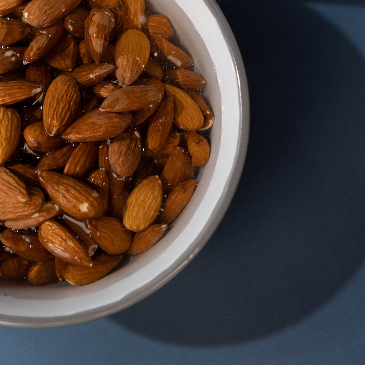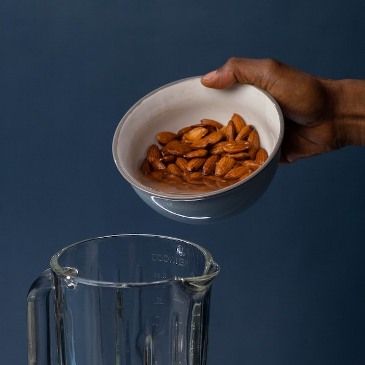A 2020 report claimed cow’s milk consumption has dropped by 50% in the UK which is great news for the cows. Almond milk is a popular choice as a replacement so it’s no surprise we see more intolerance and people asking questions like “Can almond milk cause diarrhea?”. It’s today’s topic here at Vegan Slate.
Can Almond Milk Cause Diarrhea?
Almond milk is unlikely to cause diarrhea, not least because there is very little actual almond content in most commercial products. It’s more probable that the food additives used in many store bought almond milks are the cause of diarrhea and digestive complaints.
Watch: Thomas DeLauer on the carrageenan additive in almond milk
(the title is a bit dramatic but we’ll let Thomas off just this once 🙂 )
Why Is Almond Milk So Popular?
In 2020 the UK based Agriculture and Horticulture Development Board reported a 50% decline since 1974 in the volume of liquid milk being consumed here in the British Isles.

The picture is not as simple as one might think though. While liquid milk sales per capita have indeed plummeted, the demand for cheese has increased. It seems, as a nation, we’re still hopelessly addicted to dairy.
Plant milks still only accounted for 4.6% of the overall market and the figures are based on a 2018 dataset. We can safely say in 2023, plant-based replacements almost certainly enjoy a larger chunk of market share.
Oat milks have seen a massive uptake over the last couple of years and now rival almond milk as the go-to when people want to switch away from the baby calf rearing fluid.
Almond milk is seen as a healthy option but a small percentage of consumers experience digestive issues after drinking it, even if they are not allergic to almonds.
Is It The Almonds Or The Additives?
If you read the labels on the products you buy you’ll know that almond milk is mostly water. Very expensive water, at that!
 Some of the cheaper offerings may contain as little as 1.5% almonds in that carton. Consequently, it’s highly unlikely the almond content is going to cause diarrhea or other stomach troubles.
Some of the cheaper offerings may contain as little as 1.5% almonds in that carton. Consequently, it’s highly unlikely the almond content is going to cause diarrhea or other stomach troubles.
While we’re on the subject, cow’s milk is also mostly water. About 87% in fact. So if you come across the anti-vegan Twitter trolls citing percentages of water content in plant milks as some kind of woke conspiracy, you can put them right.
Anyway … if it’s not the almonds, what else might be messing with your gut?
Well, the manufacturers like to add some other ingredients to the product to make it behave more like cow’s milk and less like ground up nuts with water.
Additives like carrageenan, soy lecithin and other ‘improvers’ have been shown [1] to cause a reaction in a small number of people.
In the article “Can Almond Milk Mess Up Your Stomach?” we look more closely at these common additives and explain why it’s probably not the almonds causing you grief. (link opens in a new tab)
Granted, most of the evidence is anecdotal and negative reactions do seem to be rare in the grand scheme of things but there is definitely an issue for some individuals.
Always Check The Expiry Date
This may seem obvious but many people forget to check the expiry date when consuming commercial almond milk and the effects can be quite uncomfortable.

You can usually tell when almond milk has gone bad. You may find the carton is bloated when you pick it up. This is due to the gases released as the contents decay, producing bad bacteria.
If you drink too much gone off almond milk you may very well experience diarrhea along with stomach cramps and bloating. Symptoms may be exacerbated if you already have a condition like IBS, for example.
But most of us will take one glug of a product which is off and immediately reject it. Others may have a more sensitive gut and react more readily to the harmful bacteria which build up.
These people may find themselves drinking more of a product which might be still palatable but just on the turn with enough bacteria in there to set them off.
Just goes to show, we’re all different.
Make Pure Almond Milk At Home
Nut allergies notwithstanding, one way to establish if you’re having a reaction to almond milk is to make your own. This way you can eliminate the additives commonly used and be more certain about what is causing your diarrhea.
 If you have a blender like a Vitamix, It’s really easy to make almond milk with just two ingredients. Almonds and filtered water.
If you have a blender like a Vitamix, It’s really easy to make almond milk with just two ingredients. Almonds and filtered water.
Just make sure you soak a cup of almonds overnight and give them a good rinse off before use. This helps to remove some of the phytic acid which can hinder the body’s ability to absorb nutrients from the finished product.
As a side note, there is much talk of phytic acid and how it is an anti-nutrient (the anti-vegan brigade particularly like to latch on to this). Phytic acid may mess with some people’s digestion but it is not the villain it is made out to be and actually may be beneficial [2].
But I digress.
Take your soaked/rinsed almonds and pop them in your blender with two pints of filtered water. For a more creamy experience you can reduce the water content and over time you’ll hit your ‘sweet spot’.
If you like, you can add a pinch of salt and a couple of pitted dates to naturally sweeten your delicious homemade almond milk.
Blend it all up fully using 30 second bursts on your blender (this avoids creating too much heat) and decant into a nut bag or muslin cloth over a bowl to collect your filtered almond milk.
Bottle up and refrigerate immediately or drink your highly nutritious milk straight from the bowl … fresh almond milk made like this is absolutely divine and so very different from the commercial products.
Conclusion: Almond Milk Is Unlikely To Cause Diarrhea
If you find your stomach is upset after consuming almond milk then it’s more likely the additives in there which are causing you problems.

Eliminating the additives (by making your own) is a sure fire way to zoom in on what is really causing your diarrhea, bloating or belly aches.
Carrageenan is a common additive in many foods, vegan or otherwise and it has been shown to cause digestive issues in some people.
Unless you have a specific almond allergy, it’s unlikely to be the nut content in almond milk which is setting you off – there’s very few almonds in the commercial product.
I hope this article has helped to answer your question today. If it did then a share on your socials is always appreciated (use the buttons below). If you have any thoughts of further questions please leave me a comment below … I always respond.
Lastly, if you like the content here on Vegan Slate why not sign up to our new post alerts mailing list? We’ll let you know when there’s fresh material published and we never spam.
Thanks for reading and have a peaceful day.
Rohan.
[1] Fahoum L, Moscovici A, David S, Shaoul R, Rozen G, Meyron-Holtz EG, Lesmes U. Digestive fate of dietary carrageenan: Evidence of interference with digestive proteolysis and disruption of gut epithelial function. Mol Nutr Food Res. 2017 Mar;61(3). doi: 10.1002/mnfr.201600545. Epub 2017 Jan 25. PMID: 27718308. [2] Graf E, Eaton JW. Antioxidant functions of phytic acid. Free Radic Biol Med. 1990;8(1):61-9. doi: 10.1016/0891-5849(90)90146-a. PMID: 2182395.
Photos by Cottonbro Studio.
